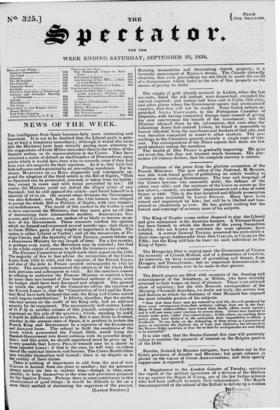NEWS OF THE WEEK.
THE intelligence.from Spain becomes daily more interesting and important. It is not to be doubted that the Liberal party is gain- ing at least a temporary ascendancy; although it would also seem that the Ministers have been recently paying more attention to the suggestions ofJuste Milieu statesmen than to the wishes of the Spanish nation, or its representatives in the Cortes. They have sustained a series of defeats in theChamb«s of Procuradores, upon points which it would have been wise to concede, even if they had been sure of a majority for their rejection. As it is, they have lost both influence and reputation by an unavailing resistance. For in- stance, MARTINEi DE LA ROSA eloquently and vehemently op- posed the adoption of the third article in the Bill of Rights, "That no Spaniard can be prosecuted, arrested, or taken from his habita- tion, except in cases and with forms prescribed by law." Of course, the Minister could not defend the illegal arrest of any Spaniard; but he still opposed the article-sand found himself in a minority of 48 to 50. On several ether divisions the Government was also defeated ; and, finally, on the Ilth instant, was obliged to accept the whole Bill or Petition of Rights, with very immate- rial modifications. The result of this contest in the Cortes is said to have convinced the Ministers, that they must give up all idea of maintaining their intermediate position. ARGUELLES, GA- LIANO, and CALATRAVA, are spoken of as likely to become mem- bers of the Government. These accounts confirm the opinion which we formed and expressed several months ago—that there is no Juste Milieu party of any weight or importance in Spain. The nation is either Liberal or Carlist ; and all the manoeuvres of Fo- reign Courts, and the dexterity of their Envoys, cannot bolster up a Doctrinaire Ministry for any length of time. For a few months, or perhaps even years, the Movement may be retarded ; but that is the whole extent of success to which the trimmers can attain.
The Finance Committee at length made their report on the 11th. The majority of five to four advise the recognition of the Cortes Loans from 1820 to 1823, and the rejection of the French Loans, and also of thedebt to' France secured subsequently to 1823 by treaty. The minority, recommeed the, adoption of the whole Debt both previous and subsequent to 1823. All the members concur in refusing to authorize the Finance Minister to contract a loan for more than two instead of four hundred millions of reals, until his budget shall have been discussed and adopted. The ground on which the majority of the Committee advise the rejection of the French Loans is, that the "Constitution of 1812 and the Esta- tuto Real have both declared that only the King and Cortes united could impose Contributions." It follows, therefore, that the parties who lent money on the credit of the King only, had no national security for its repayment. The uncommonly well-written Letter
of O. 1'. Q. in another column of this journal, contains a forcible argument on this side of the question ; which, standing by itself, it would be difficult indeed to refute. But it may fairly be doubted, whether in the present state of Spain, it is prudent to irritate the French King and Government by a rejection of the GUEBHARD
and Aou4no loans. The refusal to fulfil the conditions of the treaty which guaranteed the French Debt, would bring the Spanish Government into direct collision with its powerful neigh-
bour; and 'this point, we should apprehend must be given up. It is very possible that Louis PHILIP himself may be a sharer in these rejected Loans : if that is the case, he will take excellent
care of the national interests and honour. The Cortes Bondholders may consider themselves well treated: there is no dispute as to the validity of their claims. There is nothing of importance to add from the seat of war. CARLOS is hunted from one place to another ; but his pursuers
always arrive too late to capture him,—though in time, occa- sionally; to help themselves to the wine and provisions prepared for the fugitive Prince. Perhaps there is some contrivance in this
abandonment of .good things: it would be difficult to hit on a more likely method of slackening the eagerness of the pursuit. Burning monasteries and devastating church property, is a favourite amusement of RODIL'S troops. The Courier shrewdly observes, that such proceedings are not likely to assist the credit of a Government which looks to the sale of this property as the means of paying its debts.




















